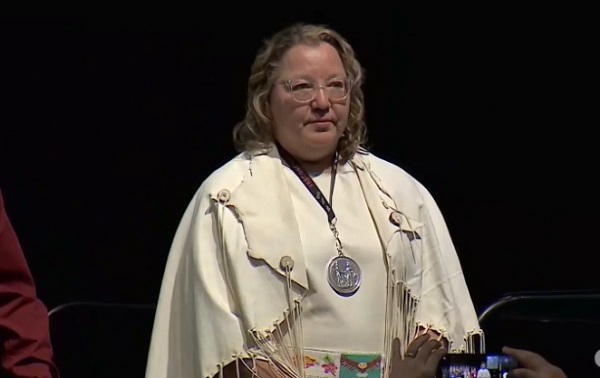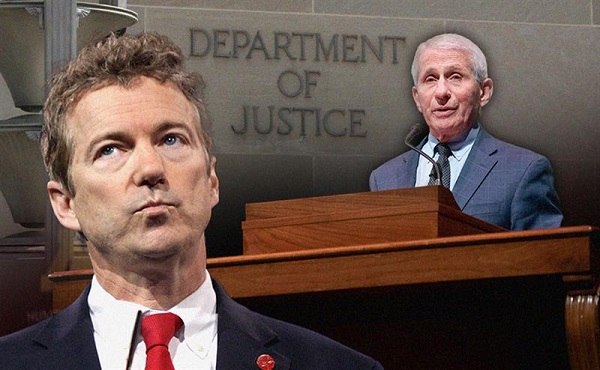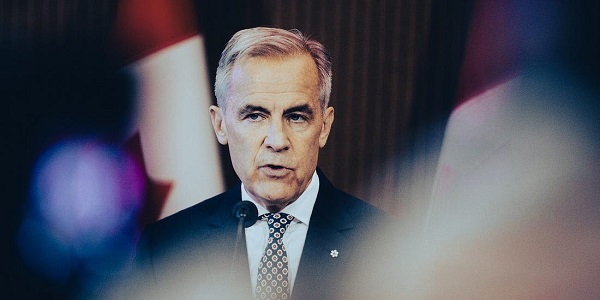Frontier Centre for Public Policy
How the new National Chief can restore the legitimacy of the AFN

Newly elected national chief of the Assembly of First Nations (AFN), Cindy Woodhouse
From the Frontier Centre for Public Policy
At times, we lose sight of the fact that not discovering bodies would be a profoundly positive outcome for First Nations and for Canada. This could help reconciliation efforts and bring peace to First Nation communities, particularly for Indigenous individuals of Christian faith.
Cindy Woodhouse, the newly elected national chief of the Assembly of First Nations (AFN), has a lot of work to do as she sets out to unify the fractured organization and rebuild its legitimacy in the eyes of First Nations across Canada.
To begin, the new national chief should forge her own independent path. Instead of immediately prioritizing internal reforms, she could facilitate reconciliation within First Nation communities by showing leadership in addressing ongoing, challenging conversations that remain unresolved in First Nation communities right now.
Although engaging in these discussions will subject her to criticism, leading from the top on difficult topics will often do that.
The first topic of conversation is the matter of unmarked graves near residential schools.
In 2021, the Tk’emlups te Secwepemc Indigenous community in British Columbia made headlines by announcing the discovery of 215 unmarked graves, believed to belong to children, through ground-penetrating radar. The allegation sent shockwaves across Canada and around the world. Mainstream media extensively covered these allegations, creating impressions of mass murder of children and human rights atrocities.
In reaction to these allegations, churches, especially Roman Catholic ones, became targets of vandalism and arson. Some individuals on reserves expressed their anger by targeting churches within their communities. Records indicate that there were over 60 incidents involving churches in 2021 alone.
Regrettably, churches affiliated with First Nation communities are still reporting attacks on their properties. At last count, some alternative media outlets are reporting a total of 100 incidents of arson and vandalism on churches. Just recently, video footage revealed an attempted arson on a Roman Catholic church in Regina, which only conservative outlets seemed to cover.
The CBC – three years late to the issue – ran an investigative story on the incidents that only seemed to serve as a platform for anti-Christian bigotry and to provide justification for the indefensible actions.
At the time, National Chief Perry Bellegarde – to his credit – condemned these acts and called for an end to them. Other prominent Indigenous voices also spoke up.
However, it’s crucial to admit that these claims of unmarked graves remain unverified and lack concrete evidence. Without excavation or exhumed bodies, it’s impossible to conclusively determine whether these are indeed human remains.
Indigenous communities in Canada must openly express this sentiment, and the national chief of the AFN is a prominent voice to convey this message.
No one denies that children died at these institutions. Tuberculosis took the lives of thousands of indigenous children who attended residential schools, day schools, or no school at all. It was a major killer of Indigenous people at the time.
However, this issue is an open and festering wound, particularly for many Indigenous communities. It is also a stain on Canadians and our collective history. Even today, Christian places of worship within Indigenous communities are subjected to reprehensible attacks.
Woodhouse must lead the AFN in addressing this difficult discussion by stating the truth. There is no evidence to substantiate the allegations of widespread child murder, and it’s time for Indigenous communities to acknowledge this and focus on healing their communities.
Conservative Leader Pierre Poilievre has stated that Parliament should launch a comprehensive investigation into the allegations of unmarked graves at the Kamloops Indian Residential School. Woodhouse should support his initiative and ensure the co-operation of all political parties. This would provide closure to many Indigenous families.
At times, we lose sight of the fact that not discovering bodies would be a profoundly positive outcome for First Nations and for Canada. This could help reconciliation efforts and bring peace to First Nation communities, particularly for Indigenous individuals of Christian faith.
No First Nation leader should want this festering wound to remain exposed.
Thankfully, the next conversation Woodhouse must address is not as difficult as the first.
As the debate rages over the carbon tax across Canada, it’s often overlooked that these taxes deeply impact First Nations. The federal government’s centralized energy policies are harming Indigenous communities. Imposing ‘clean energy’ mandates on many First Nations people who rely heavily on diesel and lack alternative options is simply not feasible for many communities. Woodhouse has said she will support a review of the impacts of the carbon tax on First Nations, but she must do more and vehemently oppose the government’s whole green agenda.
She must lead the AFN in rejecting all unnecessary and arbitrary Net Zero and clean energy targets. The government’s ‘Just Transition’ strategy – leaving resources untapped – is a direct threat to energy-producing First Nations. First Nations should have the opportunity to thrive in the energy sector just like any other community.
Both these conversations will be divisive and polarizing, but the AFN must lead them because the lack of resolution is harming Indigenous communities.
Joseph Quesnel, is a Senior Research Fellow with the Frontier Centre for Public Policy.
Business
It’s Time To End Canada’s Protectionist Supply Management Regime

From the Frontier Centre for Public Policy
Senior Fellow Brian Giesbrecht says it’s time to stop coddling millionaire dairy barons. Supply management drives up grocery bills, blocks trade and makes Canada a global joke. Australia fixed it—we can too.
Canadians are paying the price for political cowardice
Canada’s outdated supply management system forces the average Canadian family to spend $500 a year to protect a small group of wealthy dairy producers, most of them millionaires. This protectionist regime enriches a few at the expense of many, drives up food prices and undermines Canada’s credibility in trade negotiations. It no longer fits the times, and it has to go.
Let’s be clear: this isn’t about attacking dairy farmers. Most are hardworking, conscientious people who’ve built their lives around a system they didn’t create. They rise early, work long hours, rarely take holidays and deserve fair compensation if the system is dismantled. But good intentions don’t justify bad policy.
Under supply management, the government tightly controls how much dairy, poultry and eggs Canadian farmers can produce and imposes steep tariffs—sometimes more than 400 per cent—on imported products to limit competition. The result is artificially high prices, limited consumer choice and retaliatory tariffs from other countries.
This system, once designed to protect small family farms, is now dominated by fewer than 10,000 large operations, many worth millions. It no longer serves its original purpose, yet it remains in place because of political cowardice. Pierre Poilievre and Mark Carney both know the system is flawed but won’t challenge it. Why? Because it’s popular in Quebec, a province with significant electoral influence. No party wants to risk alienating those voters.
Australia and New Zealand once faced similar challenges. They phased out their systems, fairly compensated farmers through levies and built globally competitive dairy sectors. We can too. Trump’s return to power may force our hand, but it also gives us an opportunity to act on what we should have done long ago.
Even without outside pressure, the inefficiency is clear. Every year, billions of litres of milk are dumped when quotas are exceeded. At the same time, Canadian companies like Saputo are forced to relocate abroad to reach global markets. Our artisan cheese producers are trapped in a small domestic economy while foreign markets block our exports in retaliation for our own protectionism.
The hypocrisy is glaring. We call for free trade but defend a system that imposes up to 400 per cent tariffs on imports. Our global partners are right to scoff.
Trump did. In a social media post, he wrote: “Canada is a very difficult country to TRADE with, including the fact that they have charged our Farmers as much as 400 per cent Tariffs, for years, on Dairy Products.” And in his July 10 letter announcing 35 per cent tariffs on Canadian goods, he added: “Canada charges extraordinary Tariffs to our Dairy Farmers—up to 400 per cent—and that is even assuming our Dairy Farmers even have access to sell their products to the people of Canada.”
This isn’t just an American objection. High-quality dairy from France and Germany can’t be sold in Canada because of our import barriers. Their governments respond by blocking our dairy exports. Canada loses jobs, investment and credibility.
Some defenders claim foreign dairy is unsafe. But countries like France and Germany have food safety standards as strict as ours. And Canada already has legal mechanisms to block substandard imports. We don’t need tariffs for that.
Former Liberal MP Martha Hall Findlay said it plainly: supply management is a dead end. So did Maxime Bernier, who made it a central issue during his bid for the Conservative leadership. The dairy lobby made sure he didn’t win. And we’re still stuck.
Now, all parties have voted to exclude supply management from current trade talks. We are entering negotiations that demand fair treatment while protecting one of the most unfair systems in the developed world. It’s a national embarrassment.
But this can change. A phased buyout funded by a modest, temporary levy—not taxpayer dollars—could end supply management and open our dairy sector to global opportunity. Australia and New Zealand proved it works. Their citizens don’t pay $10 for butter or yogurt. Neither should we.
It’s time to stop protecting the past. Dismantle the system. Free our producers. Lower grocery bills. Restore our credibility.
Maxime Bernier saw it in 2017. Trump is saying it again in 2025.
This time, we’d better listen.
Brian Giesbrecht is a retired judge and senior fellow at the Frontier Centre for Public Policy.
Frontier Centre for Public Policy
Canada’s New Border Bill Spies On You, Not The Bad Guys

From the Frontier Centre for Public Policy
By Lee Harding
Lee Harding warns that the federal government’s so-called border bill lets officials snoop on your data, ban big cash payments and even open your mail – all without a warrant
Think Bill C-2 is about stopping fentanyl? Think again. It lets the feds snoop your data, open your mail and ban big cash payments – no warrant needed
The federal government is using the pretext of border security, the fentanyl crisis and transnational crime to push through Bill C-2, legislation that dangerously expands surveillance powers, undermines Canadians’ privacy and restricts financial freedom. This so-called Strong Borders Act is less about protecting borders and more about policing citizens.
Bill C-2, a 130-page omnibus bill introduced on June 3, grants broad new powers to government agencies to spy on Canadians and share personal information with foreign countries. A more honest title might be the Snoop and Gossip Act.
Among its most intrusive provisions, the bill would make it illegal for any business, profession or charity to accept cash payments over $10,000, even if made in smaller, related transactions. Want to pay a contractor $10,001 in five separate payments for home renovations? Too bad.
The Justice Centre for Constitutional Freedoms quickly condemned the move. “Restricting the use of cash is a dangerous step toward tyranny and totalitarianism,” the organization posted to X. “Cash gives citizens privacy, autonomy, and freedom from surveillance by government and by banks.”
Under Bill C-2, internet service providers could be compelled—under threat of fines—to hand over names, locations and “pseudonyms” of users without a warrant. Any peace officer or public officer can demand this data by merely claiming “reasonable grounds to suspect” an offence “has been or will be committed.”
It doesn’t stop there. The bill would also authorize the government to open private mail under the same vague threshold of suspicion.
Experts in law and privacy say the bill is a massive overreach. University of Ottawa internet law scholar Michael Geist and Kate Robertson of the University of Toronto’s Citizen Lab both point out that successive federal governments have sought to expand internet surveillance for years, but Bill C-2 goes further than ever before.
“Bill C-2’s big brother tactics combine expansive warrantless disclosure with unprecedented secrecy,” Geist warns. He adds that the bill “overreaches by including measures on internet subscriber data that have nothing to do with border safety or security but raise privacy and civil liberties concerns.”
If the intent were truly to combat fentanyl trafficking and transnational crime, better tools already exist. Conservative MP Frank Caputo pointed out that the bill has 16 parts but says nothing about increasing penalties or jail time for fentanyl traffickers.
“There is nothing about bail in the bill,” Caputo said during early debate on the bill. “In this omnibus bill, it says that offenders can serve their sentence for trafficking in fentanyl from their couch.”
Bloc Québécois MP Claude DeBellefeuille argued that strengthening border security requires more boots on the ground. Two rural border crossings in her riding recently had their staffed hours cut in half.
“It is estimated that the CBSA (Canada Border Services Agency) already has a shortage of between 2,000 and 3,000 border services officers for current duties. If they are given new responsibilities, however necessary, there will be an even greater shortage,” she said.
Not only does Bill C-2 contradict Supreme Court precedent. It also sets the stage for Canada to share sensitive personal information with foreign governments. In 2014, the court ruled that Canadians have a “reasonable expectation of privacy in the subscriber information” provided to internet service providers and that police requests for such data amount to a “search” requiring a warrant.
Robertson warns that the bill not only defies this precedent but also enables Canada to share this dubiously acquired information with 49 other countries under the Second Additional Protocol to the Cybercrime Convention. Canada signed the agreement in 2023 but hasn’t ratified it. Bill C-2 would make that possible.
She calls the protocol’s weak human rights safeguards “a direct threat to existing protections under international human rights law.” Robertson co-authored a submission urging the Department of Justice to reject the 2AP and instead support data-sharing frameworks that are built on consistent rights protections across all signatories.
Further complicating matters, Canada is in negotiations with the United States over a data-sharing agreement under that country’s CLOUD Act. Canada’s willingness to comply may reflect lingering trade pressures from the Trump administration, pressures that could again push Canada to compromise its legal independence and citizens’ rights.
This bill should be scrapped or thoroughly revised. Canadians should not have to surrender their privacy and human rights to serve a global law enforcement agenda that disregards civil liberties. If the line between national security and authoritarianism is erased, the greatest threat to Canadians may no longer be drug traffickers—it may be their own government.
Lee Harding is a research fellow at the Frontier Centre for Public Policy.
-

 Alberta2 days ago
Alberta2 days agoMedian workers in Alberta could receive 72% more under Alberta Pension Plan compared to Canada Pension Plan
-

 COVID-192 days ago
COVID-192 days agoSen. Rand Paul: ‘I am officially re-referring Dr. Fauci to the DOJ’
-

 Crime2 days ago
Crime2 days agoDEA Busts Canadian Narco Whose Chinese Supplier Promised to Ship 100 Kilos of Fentanyl Precursors per Month From Vancouver to Los Angeles
-

 Education2 days ago
Education2 days agoTrump praises Supreme Court decision to allow dismantling of Department of Education
-

 Business2 days ago
Business2 days agoConservatives demand probe into Liberal vaccine injury program’s $50m mismanagement
-

 National1 day ago
National1 day agoDemocracy Watch Blows the Whistle on Carney’s Ethics Sham
-

 Business2 days ago
Business2 days agoCanada must address its birth tourism problem
-

 International1 day ago
International1 day agoMatt Walsh slams Trump administration’s move to bury Epstein sex trafficking scandal





